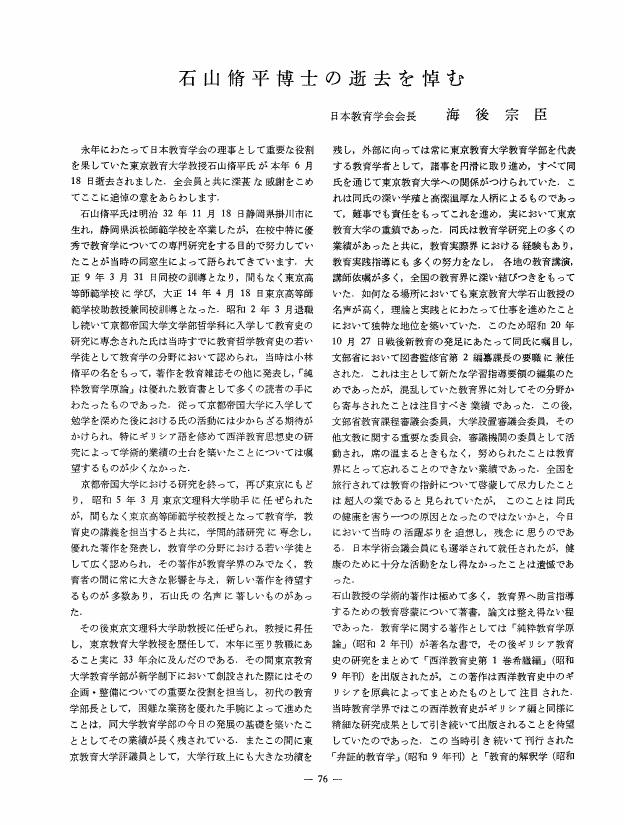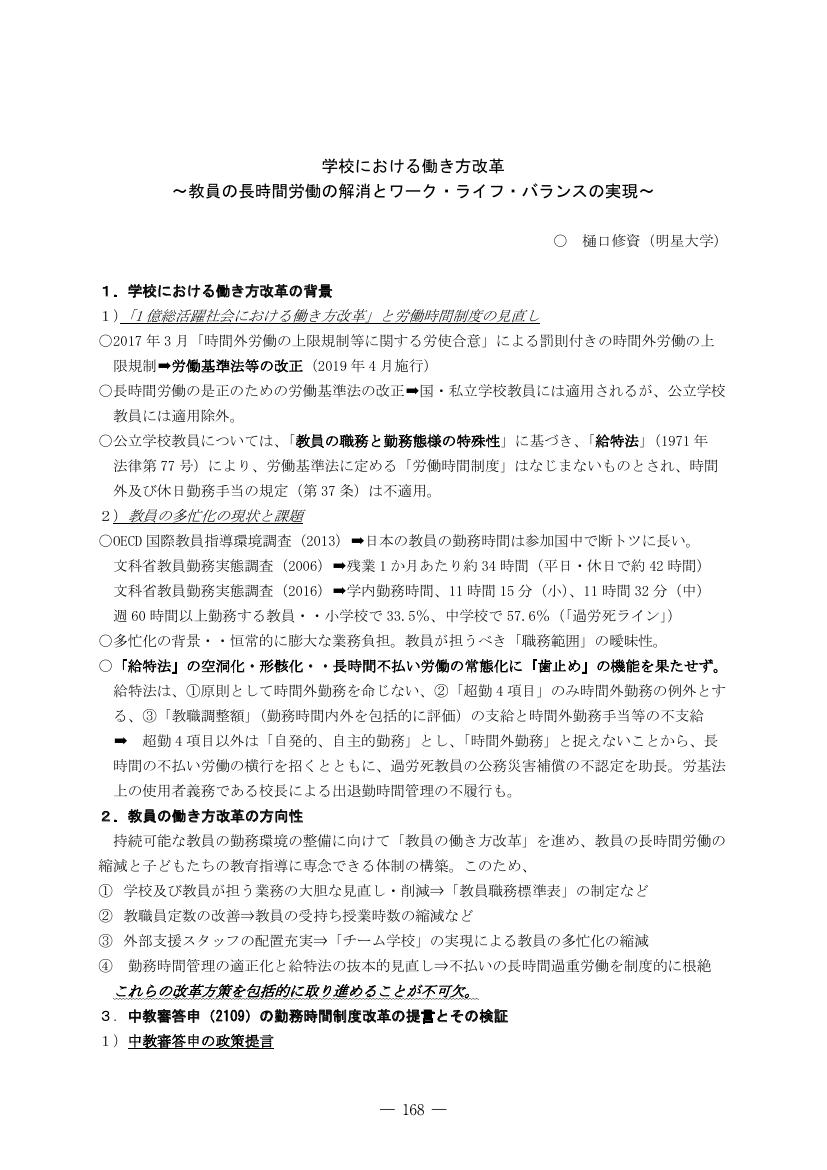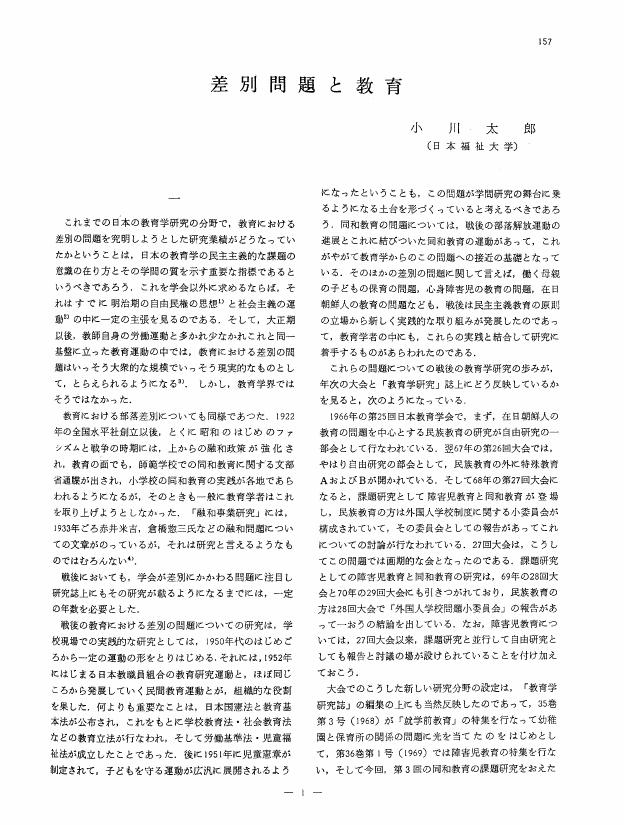1 0 0 0 OA 石山脩平博士の逝去を悼む
- 著者
- 海後 宗臣
- 出版者
- 一般社団法人 日本教育学会
- 雑誌
- 教育学研究 (ISSN:03873161)
- 巻号頁・発行日
- vol.27, no.3, pp.240-241, 1960-09-30 (Released:2009-01-13)
1 0 0 0 OA 学校教育における「あいさつ」についての考察 ― ある小学校の実践を手掛かりとして ―
- 著者
- 安部 孝
- 出版者
- 一般社団法人 日本教育学会
- 雑誌
- 日本教育学会大會研究発表要項 (ISSN:2433071X)
- 巻号頁・発行日
- vol.78, pp.102-103, 2019-07-10 (Released:2020-01-30)
- 参考文献数
- 3
1 0 0 0 OA 近代学校における身分的差別
- 著者
- 安川 寿之輔
- 出版者
- 一般社団法人 日本教育学会
- 雑誌
- 教育学研究 (ISSN:03873161)
- 巻号頁・発行日
- vol.38, no.3, pp.175-186, 1971-09-30 (Released:2009-01-13)
- 参考文献数
- 58
1 0 0 0 OA 大淀昇一著『宮本武之輔と科学技術行政』
- 著者
- 細井 克彦
- 出版者
- 一般社団法人 日本教育学会
- 雑誌
- 教育学研究 (ISSN:03873161)
- 巻号頁・発行日
- vol.57, no.3, pp.298-299, 1990-09-30 (Released:2009-01-13)
1 0 0 0 OA 学校における働き方改革 ~教員の長時間労働の解消とワーク・ライフ・バランスの実現~
- 著者
- 樋口 修資
- 出版者
- 一般社団法人 日本教育学会
- 雑誌
- 日本教育学会大會研究発表要項 (ISSN:2433071X)
- 巻号頁・発行日
- vol.78, pp.168-169, 2019-07-10 (Released:2020-01-30)
1 0 0 0 OA 園田英弘,濱名篤,廣田照幸著「士族の歴史社会学的研究」武士の近代
- 著者
- 辻本 雅史
- 出版者
- 一般社団法人 日本教育学会
- 雑誌
- 教育学研究 (ISSN:03873161)
- 巻号頁・発行日
- vol.62, no.2, pp.135-137, 1995-06-30 (Released:2009-01-13)
1 0 0 0 OA 差別問題と教育
- 著者
- 小川 太郎
- 出版者
- 一般社団法人 日本教育学会
- 雑誌
- 教育学研究 (ISSN:03873161)
- 巻号頁・発行日
- vol.38, no.3, pp.157-163, 1971-09-30 (Released:2009-01-13)
- 参考文献数
- 14
1 0 0 0 OA 教育政治学の創成 : 教育学と政治学の協働へ向けて(ラウンドテーブル15,発表要旨)
- 著者
- 小玉 重夫 荻原 克男 田村 哲樹 村上 祐介 小玉 重夫
- 出版者
- 一般社団法人 日本教育学会
- 雑誌
- 日本教育学会大會研究発表要項 (ISSN:2433071X)
- 巻号頁・発行日
- vol.74, pp.112-113, 2015-08-28 (Released:2018-04-20)
1 0 0 0 OA 少子化の中の教員養成と教育学 教員養成系大学・学部の挑戦
- 著者
- 毛利 猛
- 出版者
- 一般社団法人 日本教育学会
- 雑誌
- 教育学研究 (ISSN:03873161)
- 巻号頁・発行日
- vol.87, no.2, pp.203-213, 2020 (Released:2020-09-30)
少子化の進行に伴って新しい「大学の大衆化」の段階に突入し、教員養成の自然な基盤が掘り崩されている中で、教職が労働市場で急速に魅力を失いつつある。教員の「量の確保」の問題は「質の担保」の問題と必ず連動する。これらの教員養成をめぐる危機について考察した上で、実践力養成への期待の高まりと失望、それへの「大学における教員養成」と「教育学」教育の側からの対応について、この間の教員養成政策とも絡めながら論じた。
1 0 0 0 OA 今田 絵里香 著『「少年」「少女」の誕生』
- 著者
- 和崎 光太郎
- 出版者
- 一般社団法人 日本教育学会
- 雑誌
- 教育学研究 (ISSN:03873161)
- 巻号頁・発行日
- vol.87, no.2, pp.264-265, 2020 (Released:2020-09-30)
1 0 0 0 OA 上田 誠二 著『「混血児」の戦後史』
- 著者
- 児島 明
- 出版者
- 一般社団法人 日本教育学会
- 雑誌
- 教育学研究 (ISSN:03873161)
- 巻号頁・発行日
- vol.87, no.2, pp.260-261, 2020 (Released:2020-09-30)
- 著者
- 佐藤 秀夫
- 出版者
- 一般社団法人 日本教育学会
- 雑誌
- 教育学研究 (ISSN:03873161)
- 巻号頁・発行日
- vol.68, no.4, pp.386-396, 2001-12-30 (Released:2007-12-27)
1 0 0 0 OA 男女平等教育と日本の教育学研究
- 著者
- 安川 寿之輔
- 出版者
- 一般社団法人 日本教育学会
- 雑誌
- 教育学研究 (ISSN:03873161)
- 巻号頁・発行日
- vol.49, no.3, pp.244-254, 1982-09-30 (Released:2009-01-13)
- 参考文献数
- 52
1 0 0 0 OA 社会科におけるグローバル教育の4つのアプローチ
- 著者
- 大津 和子
- 出版者
- 一般社団法人 日本教育学会
- 雑誌
- 教育学研究 (ISSN:03873161)
- 巻号頁・発行日
- vol.61, no.3, pp.279-286, 1994-09-30 (Released:2009-01-13)
- 参考文献数
- 27
1 0 0 0 OA 人格の完成をめざす教育の意味
- 著者
- 中村 清
- 出版者
- 一般社団法人 日本教育学会
- 雑誌
- 教育学研究 (ISSN:03873161)
- 巻号頁・発行日
- vol.65, no.4, pp.299-307,418, 1998-12-30 (Released:2007-12-27)
The Fundamental Law of Education specifies that education shall aim at the full development of personality. This aim has been generally accepted by most of those engaged in educational theories and practices as well as in policy making. But interpretation of the aim has been so ambiguous that quite opposite views on education have been justified. Particularly problematic is that the original intent of the aim, i.e.education should aim at the full development of personality because it is broader and more basic than the formation of a good member of the nation, seems to be forgotten by most interpretations. This paper tries to clarify the weakness of the usual interpretation of the aim and to replace it with a more reasonable one. The concept of the personality in the original interpretation of the aim presupposes that human beings are unique in that they have the ability of reson. This characteristic enables them to pursue the universal values of truth, good and beauty, free from the causality of the material world. This interpretation has been accepted by most educational literature and policy documents. The concept of reason in the interpretation is almost the same as that in the age of the Enlightenment. Such a view has been persuasively critcized since the 19th century, particularly by so-called postmodern thinkers of the present. The above interpretation of the full development of the personality neglects these criticisms and, as a result, becomes an abstract concept which fails to have concrete effect on educational practices. A dificulty in educaionsl theories based on the Enlightenment concept of the reason is that a clear distinction is made between adults and children, namely, rational adults educate irrational children until they become rational. Viewed in this way, children's ability to reason has no place in education and neither equal relationaship nor mutual understanding between adults and children can be established. Then education becomes just another name for conditioning children by adults. This is a logical consequence of the Enlightenment theory of education that justifies the transformation of public education into national education. Although human beings may bear different values in different societies and among individuals in the same society as well, they may find common values if they make an adequate effort to do so when necessary. At least this possibility should not be denied even before they try. The ability to find a common value when necessary may be called reason, because it is what makes human beings understand each other in an equal relationship. Education that aims at the full development of personality based on this understanding of reason means to enhance mutual understanding of human beings. This effort is mainly made by adults upon children within a certain society, but in principle it is open to all human beings.
- 著者
- 川口 俊明
- 出版者
- 一般社団法人 日本教育学会
- 雑誌
- 日本教育学会大會研究発表要項
- 巻号頁・発行日
- vol.77, pp.151-152, 2018
1 0 0 0 幼児教育における絵本の役割について
- 著者
- 川勝 泰介
- 出版者
- 一般社団法人 日本教育学会
- 雑誌
- 日本教育学会大會研究発表要項
- 巻号頁・発行日
- vol.34, 1975
1 0 0 0 子どもと文化をめぐって
- 著者
- 藤本 浩之輔 藤本 浩之輔 舟橋 斉 川勝 泰介
- 出版者
- 一般社団法人 日本教育学会
- 雑誌
- 教育学研究 (ISSN:03873161)
- 巻号頁・発行日
- vol.59, no.1, pp.96-97, 1992
- 著者
- 齋藤 孝
- 出版者
- 一般社団法人 日本教育学会
- 雑誌
- 教育学研究 (ISSN:03873161)
- 巻号頁・発行日
- vol.66, no.3, pp.287-294,368, 1999
この論文の目的は,「身体知としての教養(ドイツ語で言えば,ビルドゥング)」という概念の意義を明らかにすること,および,日本の伝統的な教養と教育を検討することによって,私たちによって生きられている身体の重要な役割を教育学の文脈に位置づけることである。 この概念には,二つの主な効果がある。一つの効果は,身体的な経験を通して獲得された知恵を一つの教養としてみなすようになることである。もう一つの効果は,たとえば音読や古典的な詩歌の暗誦のように,古典的な教養を学ぶ上での,私たちによって生きられている身体の重要性を評価するようになることである。生きられている身体というのは,メルロー=ポンティの『知覚の現象学』の中心概念である。「身体知としての教養」という概念は,私たちによって生きられている身体によって基礎づけられているものである。 教養というのは,通常は,多くのスタンダードな書物を読むによって得られた幅広い知識の問題とみなされている。しかし,19世紀までは,日本人にとって,五感を通して,言い換えれば,生きられた身体を通して学ぶことが非常に重要であった。日本の伝統的な学習法では,知の問題は,身体の問題と切り離すことのできないものであった。かつての日本人にとっては,教養をつけるということは,日々の生活の中で自分が生きている身体を耕すことを意味していた。それゆえに,教養ある人間には,何らかの身体的なアート(技芸)を経験していることが期待されていた。身体的な技を反復練習によって向上させる,まさにそのプロセスが,教養の概念の中心だったのである。 「身体知としての教養」という概念を代表する典型的な日本人は,卓越した小学校教師であった芦田恵之助(1873-1951)である。かれは,伝統的な呼吸法を応用したある特定の身体的実践を訓練した。そして,その身体的実践が自分自身の心身の健康にとってのみならず,教育にとって重要であると考えた。身体の基本的な技法が,自己のテクノロジーの中核であった。彼にとって,またかつての日本人の大部分にとって,教養は,心身を耕すことを意味していたのである。
1 0 0 0 B 高等学校教育の問題点
- 著者
- 内海 巖 皇 晃之 正月 定夫
- 出版者
- 一般社団法人 日本教育学会
- 雑誌
- 日本教育学会大會研究発表要項
- 巻号頁・発行日
- vol.21, pp.278-280, 1962










